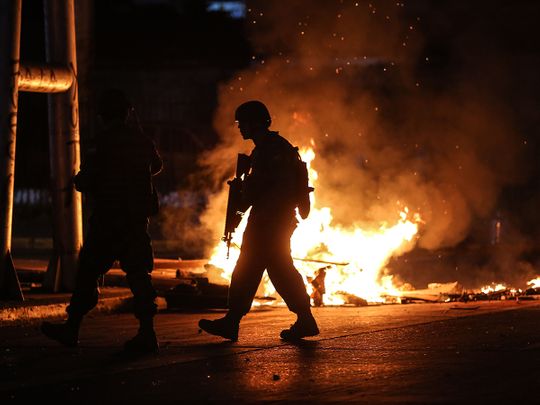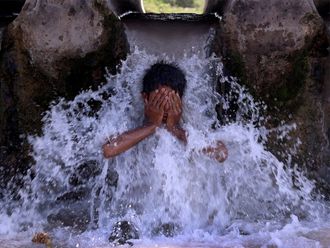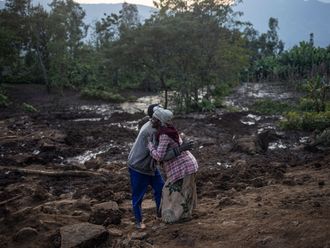
Santiago: Chile on Sunday extended a state of emergency to cities in the north and south of the country, swept by unrest that has left at least seven people dead, the government said.
New emergency decrees are being drawn up for Antofagasta in the north, Valdivia in the south, and others like Valparaiso, Temuco and Punto Arenas, Interior and Security Minister Andres Chadwick said.
Five people died Sunday when a garment factory was torched by looters near Santiago as authorities extended a curfew into a second consecutive night.
Police and the military fired tear gas and used water cannon against protesters in the capital as clashes over price hikes and social inequality raged through a third day.
Almost all public transport in the capital of seven million people was paralyzed on Sunday, with shops shuttered and many flights in and out of Santiago’s international airport cancelled.
After an emergency meeting with top state officials late Sunday, President Sebastian Pinera defended his decision to call a state of emergency — announced Friday — and deploy thousands of troops onto the streets.
“Democracy not only has the right, it has the obligation to defend itself using all the instruments that democracy itself provides, and the rule of law to combat those who want to destroy it,” Pinera said.
The conservative president was speaking after meeting with the chairmen of the Congress and Senate and the head of the Supreme Court.
Firefighters said five people died in a garment factory burned by rioters in Renca, a northern suburb of Santiago.
“Unfortunately, five bodies have been found inside the factory,” said Santiago Fire Chief Diego Velasquez.
Earlier, Interior and Security Minister Andres Chadwick said two women burned to death after a store owned by US retail chain Walmart was set alight in the early hours of Sunday.
A third victim, who authorities initially had said had died in hospital, suffered burns on 75 percent of her body.
Chadwick said two people suffered gunshot wounds following a clash with police who responded to a report of looting in a town south of Santiago.
Authorities reported 103 serious incidents throughout the country with 1,462 people detained, 614 in Santiago and 848 in the rest of the country.
Protesters set fire to buses, smashed up metro stations, knocked down traffic lights, ransacked shops and clashed with riot police in Santiago and other cities.
Curfew extended
The dusk-to-dawn curfew goes into effect from 7pm, after which people should “be calm and all in their homes,” top defence official General Javier Iturriaga announced.
Sunday’s curfew began three hours earlier than the one called on Saturday.
Iturriaga was appointed head of national defence by Pinera on Friday as he declared a state of emergency in five regions and deployed troops on the streets for the first time since Augusto Pinochet’s military dictatorship between 1974-1990.
‘Good reasons’ to protest
What started earlier in the week as a protest against a hike in metro fares escalated dramatically on Friday as demonstrators expressed anger over social inequality and the government’s liberal economic system.
On Saturday, Pinera announced he was suspending the fare increase.
Pinera acknowledged that those in the streets had “good reasons” to protest but called on them “to demonstrate peacefully.”
The appeal failed to prevent further rioting and looting, not just in Santiago but also in the cities of Valparaiso and Concepcion, where a state of emergency has also been declared.
Soldiers have been deployed in the capital as well as the O’Higgins and Coquimbo regions that have experienced unrest.
“It’s really sad what’s happening, but the people are outraged because they’re not being listened to,” 26-year-old Antonia told AFP in central Santiago.
Dozens of protesters torched a building belonging to Chile’s oldest newspaper, El Mercurio, in Valparaiso on Saturday evening, while elsewhere in the port city a metro station, supermarkets and other stores were set on fire.
Metro system hit hard
Santiago’s entire metro system — South America’s largest and most modern and used by around three million people a day — was shut down on Friday as protesters burned and vandalized stations.
Louis de Grange, president of the state Metro S.A. company, told Canal 13 the “brutal destruction” of Santiago’s metro service had caused more than $300 million in damage.
The hike in fares that set off the violence would have raised the price of peak hour travel from 800 to 830 pesos. The government said the hike, which followed a 20-peso increase in January, was driven by rising oil prices and a weakening peso.
Initially, students and others responded by fare-dodging, but underlying social tensions quickly bubbled to the surface.
On Friday, the headquarters of the ENEL Chile power company and a Banco Chile branch — both in the center of Santiago — were set on fire and heavily damaged.
Chile has the highest per capita income of Latin America at $20,000, with expected economic growth this year of 2.5 percent and just two percent inflation.
But there is an undercurrent of frustration with an economic model that has virtually privatized all health care and education, at a time that falling pensions and rising costs of basic services have exacerbated existing social inequality.










_resources1_16a30b3523c_small.jpg)

